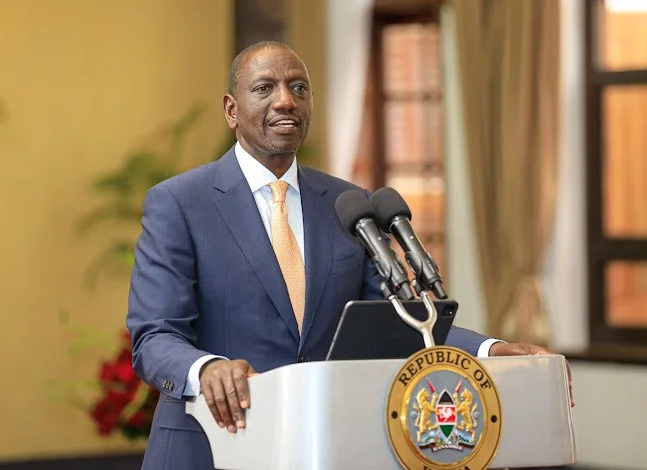
President William Ruto captured at State House in Nairobi on November 7, 2023.
Image |Courtesy
In Summary:
- President William Ruto is advocating for a significant tax increase in Kenya, aiming to raise the current rate from 14% to 22% by the end of his term.
- He argues that this move is crucial for boosting revenue and reducing reliance on borrowing. Despite acknowledging the initial challenges and complaints, Ruto believes the long-term benefits will justify the adjustment.
President William Ruto has defended the Kenyan government’s decision to implement additional taxes, emphasizing its role in bolstering the country’s revenue and lessening dependency on loans.
Ruto outlined his intentions to gradually elevate Kenya’s average tax rate from the existing 14% to 16% by the close of the year. He aims for a more substantial increase to between 20% and 22% by the conclusion of his tenure.
While acknowledging the inevitable economic strain this adjustment will impose on citizens, Ruto remains optimistic about the future payoff.
Speaking at an engagement with Harvard Business School’s Class of 2025, he assured that although complaints are anticipated, eventual appreciation for the fiscal strategy will prevail.
He stated, “It’s going to be difficult, I have a lot of explaining to do, people will complain but I know finally they will appreciate that the money we go to borrow from the World Bank is savings from other countries.”
Ruto highlighted the necessity of living within the nation’s means, emphasizing the importance of financial prudence to avoid bankruptcy and debt distress.
He dismissed perceptions of Kenya having excessively high taxes compared to regional peers, citing empirical data to support his claim.
President Ruto added, ‘Kenyans have been socialised to believe that they pay the highest taxes but empirical data shows that as of last year, our tax as a percentage of our revenues was 14%. Our peers in the continent are on an average of between 22 and 25 per cent which means our taxes are way below those of our peers.’
Addressing concerns about the proposed VAT changes, including levies on bread and motor vehicle ownership, Ruto underscored the government’s obligation to fund the 2024-2025 budget.
The Finance Bill 2024 proposes significant alterations to the VAT system, such as removing exemptions on financial services and introducing new levies on various transactions.
While acknowledging the initial hardships that such measures might pose, Ruto remains steadfast in his belief that they are indispensable for Kenya’s financial stability and long-term prosperity.
